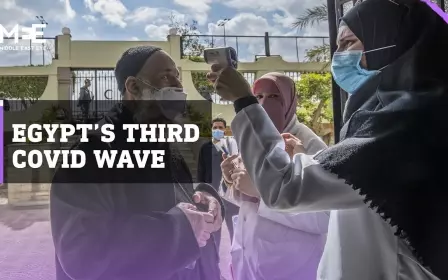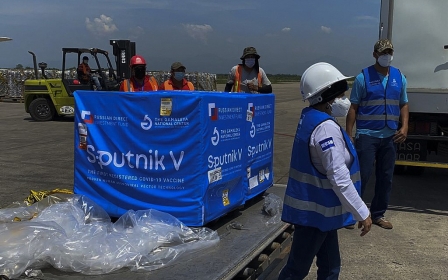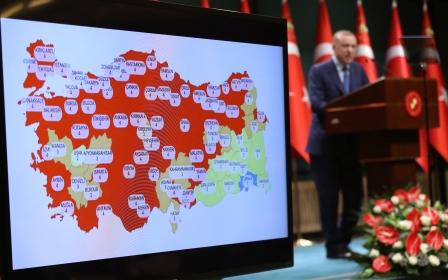Egypt aspires to become Covid-19 vaccine-making hub for Africa
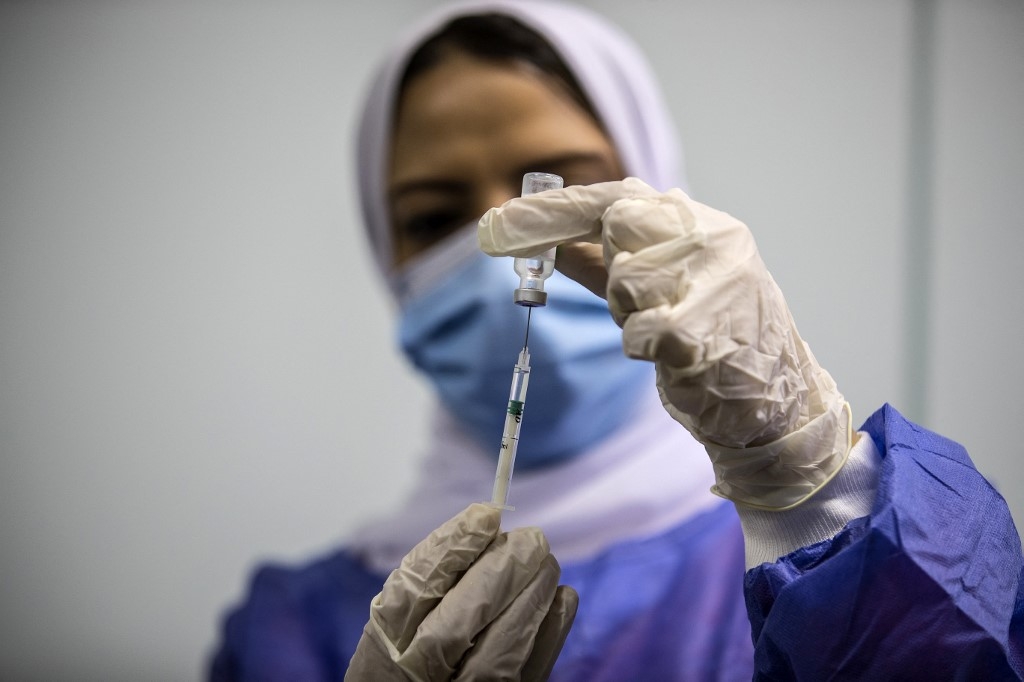
Egypt has signed deals for the manufacture of the Chinese Sinovac and the Russian Sputnik V Covid-19 vaccines, amid hopes for turning the country into a hub for the production of coronavirus vaccines for the African continent.
A state-owned company on 21 April signed two agreements with the Chinese Sinovac Company for Biological Products to produce its Covid-19 vaccine in Egypt.
A day later, an Egyptian company signed a deal with the Russian Direct Investment Fund, the Russian government's sovereign wealth fund, for manufacturing Sputnik V vaccine locally.
'The local production of vaccines is an old dream finally coming true'
- Ali Fahmi, vaccination expert
Egypt's plan is produce 80 million doses of the Chinese vaccine and 40 million doses of the Russian vaccine annually.
This, observers said, would be enough to cover the needs of Egyptians and advance the national response to Covid-19.
New MEE newsletter: Jerusalem Dispatch
Sign up to get the latest insights and analysis on Israel-Palestine, alongside Turkey Unpacked and other MEE newsletters
"The number of doses to be produced locally of the two vaccines will be enough to meet national needs," Mahmud Abulkheir, a member of the parliamentary Committee on Health, told Middle East Eye. "However, Egypt has a plan far larger than meeting local demand."
Local health officials say vaccine production surpluses will be exported to other African countries to meet growing needs in the continent.
Production ambitions
Egypt has been preparing for the local production of Covid-19 vaccines for several months now.
The Arab nation, with a population now estimated at more than 100 million, has a pharmaceutical industrial base that has been functioning for decades.
This base is now a mere shadow of its former self for multiple reasons, including misguided medicine pricing policies, the lack of sufficient funds for research, and tough competition from regional and international medicine-markers.
However, Cairo has been making efforts to bring the pharmaceutical industry back to its past strengths.
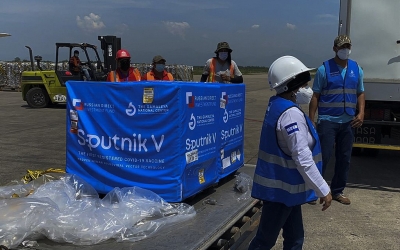
In January, Ministry of Health spokesman Khaled Megahid said Egypt looked forward to becoming a centre for making and distributing vaccines in the Middle East and Africa.
This came a short time after Minister of Health Hala Zayed toured a major complex for storing vaccines in Helwan, a sprawling industrial city in southern greater Cairo.
The complex contains refrigerators for storage of all types of vaccines.
Three months later, President Abdel Fattah el-Sisi opened a large pharmaceutical city in Qalyubia province, north of Cairo. The city will produce quality medicines and raw materials for affordable prices.
Almost 85 percent of medicines in the Egyptian market are produced locally. Nevertheless, raw materials continue to be a major challenge for the nation's 150 pharmaceutical companies, specialists said.
"Most local medicine companies depend on raw materials coming from abroad," independent medicine expert Mahmud Fouad told MEE. "They pay billions of dollars annually to import these materials."
Third wave
Preparations for the local manufacture of Covid-19 vaccines come as the scope of the disease keeps widening in Egypt and a third wave unfolds.
Daily Covid-19 infections and deaths are increasing, raising fear across the country and instigating calls for stricter abidance of prevention measures.
Daily infections are now above 800 and rising after falling from a recent peak in December, while daily deaths are now above 40.
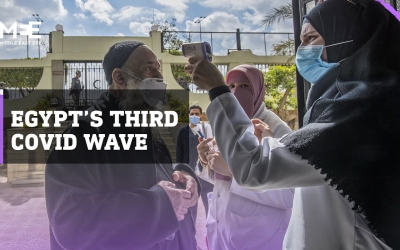
In January, Zayed said the infections and deaths reported by her ministry every day were only 10 percent of actual figures.
Deep under the current increase in infections is the failure of people to abide by restrictions and of the authorities to enforce prevention measures, heath specialists said.
"Few people abide by preventive measures, which causes the current spike," leading pulmonologist Rushdi Youssef told MEE. "The authorities have to act now to prevent the disease from spreading even more by putting more stress on preventive measures, including physical distancing and the wearing of face masks."
Health officials expect infections and deaths to peak even higher in the coming days because of family get-togethers, an important tradition in Egypt during the holy month of Ramadan, which this year will run through to May.
The intensity of the third wave of the pandemic is most noticed in the central province of Sohag, where infections and deaths are rising dramatically.
Slow vaccine rollout
The potential local production of Covid-19 vaccines also comes as Egypt moves ahead with rolling out Covid-19 vaccines at its own pace.
Health-service workers, especially at isolation hospitals, started to be immunised in late January. Nonetheless, those working at the front line of the national response to the disease continue to fall victim to it.
Around 50 health-service workers died from Covid-19 in the first half of April, raising the number of such workers who have died from the disease since it appeared in Egypt in February last year to 500, according to the Medical Syndicate.
The syndicate's secretary-general, Osama Abdel Hay, complained on 20 April about the slow pace of the immunisation of health-service workers and warned against "major perils".
Health authorities are also coming under fire for the pace of public immunisation, which started in early March.
The slow pace of the vaccine roll-out will impede Egypt's ability to contain Covid-19, specialists said.
"We have managed to vaccinate only a fraction of the population so far," Youssef said. "How will we eradicate or contain the disease in this manner?"
Up to 27 March, Egypt had administered 164,534 doses of Covid-19 vaccines, according to Covidvax.live, which offers a live count of the vaccine doses administered around the world.
Vaccine diplomacy
In mid-February this year, Sisi said his country would use its capabilities to help African countries obtain Covid-19 vaccines.
Egypt tries to use Covid-19 vaccines, of which most of Africa is deprived while rich nations get most of the vaccine doses produced so far for themselves, as a diplomatic card to win over African governments and peoples, analysts said.
This, they added, comes at a time the Arab country strives to return to the African fold.
"This is true, especially if our country will become Africa's gateway into the vaccines at this critical time," Heba al-Beshbeshi, a political science professor at Cairo University, told MEE.
Egypt neglected its ties with African nations for a long time in the past. However, it paid dearly for this, especially when it came to decisive developments in the past period, including Ethiopia's construction of a gigantic dam over the Blue Nile, the main tributary of the Nile River which gives Egypt most of its water.
Few African states have backed Egypt in its political showdown with Ethiopia. However, Cairo is now trying to rebuild confidence with other African capitals, as it works to protect its share of Nile water.
A dream come true
Health officials expect local factories to start producing the Sinovac and Sputnik V vaccines in the coming few months.
Nevertheless, this move is a long time overdue, especially given that Egypt has been talking about the local production of Chinese Covid-19 vaccines since last July.
Some people also compare Egypt with India, where the pharmaceuticals company Serum Institute of India had prepared for the production of the AstraZeneca vaccine since April last year and is now producing hundreds of millions of doses of the same vaccine for developing countries.
Local vaccine specialists also refer to some challenges on the road to producing Covid-19 vaccines in Egypt, including the poor nature of the nation's laboratories.
"We are badly in need of modernising our labs," immunisation expert Ali Fahmi told MEE. "Nevertheless, the local production of vaccines is an old dream finally coming true."
Middle East Eye delivers independent and unrivalled coverage and analysis of the Middle East, North Africa and beyond. To learn more about republishing this content and the associated fees, please fill out this form. More about MEE can be found here.


